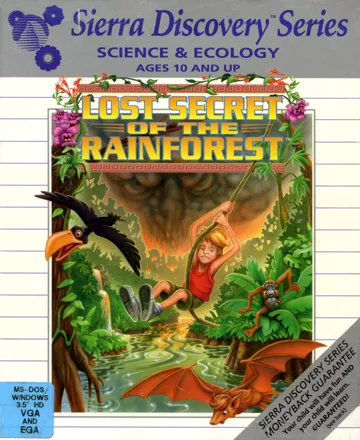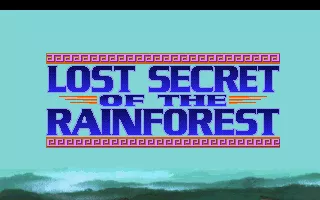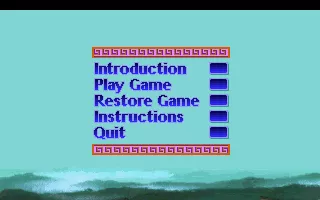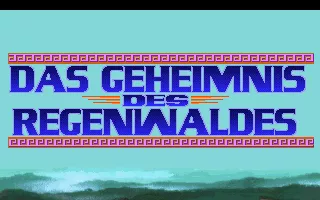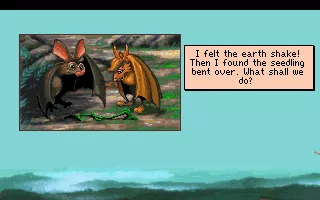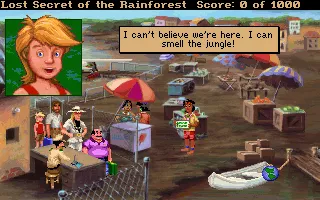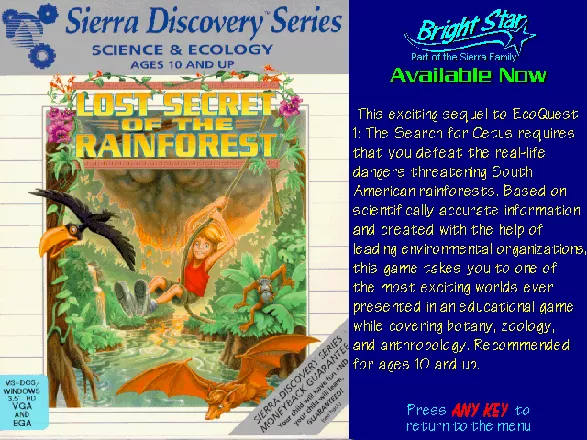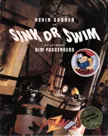Lost Secret of the Rainforest
Description official description
In Lost Secret of the Rainforest the player controls a boy named Adam Greene who, along with his father Noah, a doctor of ecology, travels to the town Iquitos in South America, to meet the Ecology Emergency Network. The two intend to go on an expedition up the Amazon river and try to establish contact with a native tribe known as the Grove People. After having separated from his father, Adam must venture into the rainforest, discover the secret of the mysterious Forest Heart and find the lost City of Gold in his pursuit of a remedy for the Grove People.
This sequel to EcoQuest: The Search for Cetus is similar to its predecessor in presentation and gameplay, being an adventure game with educational elements. Like the first game, it has an icon-based interface and does not allow the player to get irrevocably stuck in the game or let the player character die. A specific feature of this installment is the so-called "Ecorder", a device Adam uses to record information about the flora and fauna of the area he explores.
Groups +
Screenshots
Promos
Videos
Add Trailer or Gameplay Video +1 point
See any errors or missing info for this game?
You can submit a correction, contribute trivia, add to a game group, add a related site or alternate title.
Credits (DOS version)
72 People (66 developers, 6 thanks) · View all
| Lead Programming | |
| Programming | |
| Additional Programming | |
| Interpreter / Development System | |
| Graphics / Artwork | |
| [ full credits ] | |
Reviews
Critics
Average score: 76% (based on 10 ratings)
Players
Average score: 4.0 out of 5 (based on 31 ratings with 3 reviews)
The Good
"Lost Secret of the Rainforest", or "Ecoquest 2", as I usually call it, is a very well made game. It has good quality VGA graphics - while mostly not as colorful as the underwater world of "Ecoquest 1" (especially places like the seaweed maze close to the beginning or the coral reef), the sceneries are beautiful and mostly realistic anyway. In this game Adam journeys through a larger variety of terrain - from a somewhat shaggy South American town through the rainforest, a native village with a magical tree (I immediately thought about this one when encountering another giant tree in "Quest for Glory 3" - it seems there was some level of "idea borrowing" between different Sierra developer teams), a camp in the middle of nowhere and, finally, ancient ruins. This makes the game more varied than its predecessor.
The music is also very good and contributes to the atmosphere of the game. The best example could be a series of melodies around the tribal village: when Adam first lands there (literally - he falls into the mud from a tree) and has a feeling he's being watched but can't see any people, the music is slightly disquieting. Later it switches to rather sad-sounding melodies when he reaches Forest Heart, the dying magical tree that called for him. When he returns, he discovers that people have returned to the village and the background tune is now happy, energetic ethnic music.
The controls are very intuitive, as usually in Sierra games. A slightly modified version of the classic Sierra icon interface is used. (However, what is the "classic version"? - I mean, there are probably more games with a modified version that with the classic walk / look / take / talk / inventory set... "Quest for Glory" adventure/RPGs also use additional icons for magic and statistics, "Space Quests" introduce the taste / smell button for some wacky comments, "Pepper's Adventures in Time" would be a very different game without its unique Truth button...) Two extra icons are introduced: the recycling bag (already seen in "Ecoquest 1") and a strange icon that looks like a bat which just gives some random trivia about the rainforest. The Ecorder, a minicomputer that Adam uses for learning more about the rainforest, is just an item in the inventory, but due to its meaning it could perhaps deserve a place as another additional icon - at one place it would have been more obvious that yes, you can and should use it now...
The game has a little feature I like, something I would call "ineffective copy protection". In the scene when Adam is initiated into the tribe in order to be able to participate in a ceremony inside Forest Heart, he has to choose a pattern to paint his face according to what the shaman says. However, it's usually easy to connect the patterns to their meaning (for example "You must be silent as the snake" - the design is a wavy line than looks just like a slithering snake) and you can keep retrying if you get one that is less obvious.
The story, while not free from inconsequences (see "The Bad"), is very tight and captivating. It doesn't feature much of "walking back and forth waiting for something to happen" (maybe apart from the beginning, where Adam has to wait for his father to find the Ecorder so that the game can move forward and how soon it happens seems to depend on the order of things Adam did before), you are constantly doing something. However what I like most is the game's emotional value. Adam's father raised him to respect nature and so Adam is able to feel empathy for everything - not just people, but also animals and plants. These creatures are anthropomorphic (anyway, they talk), but the game clearly isn't anthropocentric - a rare combination... It reminds me of a piece from my diary about "the hypocrisy of children's literature" (however, the starting point was one of Andersen's tales): "In children's literature the whole world is ALL-SENSING" (and to me it's hypocrisy because almost all children will later be told it was a lie). "Lost Secret of the Rainforest" presents the world like this in an honest way: all world feels because it's alive, it's not a mass of objects but a home to millions of life forms. Another remarkable thing: similarly to the game being able to portray animals and plants as anthropomorphic without being anthropocentric, it also smartly avoids the typical conflict between nature and science. While some technology can be harmful to nature (the greedy developers and the example of what they can do, fortunately still a limited one: the camp they cut and burned out within the rainforest), there is no inevitable conflict: Dr. Noah Greene, Adam's father, is a scientist working to protect nature. All this is remarkable: "Ecoquest 2" is more than just an educational game that sneaks in some information, it teaches through emotion, through identification with the protagonist and his feelings. And it presents an ecological sensitivity deeper than just "see what some people do to nature", something closer to the traditional wisdom of interconnectedness. It's a pity that in our Age of Reason such a message is often allowed just for children, as a sensitivity they are expected to outgrow (this is precisely what I call "the hypocrisy of children's literature"). There is a cut between traditional wisdom and tales for children, they become subversive only when one is able to question the "objective", instrumental, emotionless thinking taught on other occasions.
The Bad
I feel slightly strange writing this after my near-manifesto, but anyway the game does have its flaws. The Ecorder, such an important item in the game, is to some extent a wasted opportunity. The information it presents is very scarce. It isn't integrated with gameplay well - you get points for everything you discover, but only once is the information necessary to get further: in the scene when Adam has to distribute visas to refugee bats. Quite at odds with other entries in the Ecorder, this time the device presents Latin names for the various bat species and the visas are identified exactly by those names. Anyway, I found this one easy - I seem to have a good memory for Latin names of animals, plants and fungi and now I no longer have to look into the entries - I just remember which species is which. At a few places it's not easy to guess where you can find the object you can record. Two most obvious examples: first the scene when Adam falls into the mud and has to use fruit to lure a wild pig closer and a vine to use as a lasso so that the animal pulls him out. First you pick up the vine, than the fruit which was underneath... stop! if you want to get maximum points or at least every single entry in the Ecorder, you have to use the device on the fruit before picking it up. Later, around the middle of the game, Adam escapes the camp by making a canoe from a log and using a covered tennis racket as a paddle. He floats on a river along a sad landscape created by cutting and burning rainforest vegetation and it's an entry in the "Eco-Threats" category - however, it isn't immediately obvious that yes, the inventory is available at this point. Moreover, the Ecorder also acts like a spoiler - if the available entries weren't shown before being recorded, the player wouldn't have been sure what to look out for - however, this way you can guess what's coming next.
The Recycle icon has been "recycled" from "Ecoquest 1", but this time it is mostly just an addition not integrated with the rest of the game. OK, recycling seems basic to "everyday ecological thinking" and that's probably exactly why it's here because the game could have done well without it. You visit just a few places where tourists have already marked "their" terrain with littering. This time you get a point for every single piece of garbage you pick up (unlike "Ecoquest 1", where it was slightly more difficult: points were awarded for finding all garbage left in a particular place), but the funny comments from "Ecoquest 1" are gone. In one place you find a useful object, a magnifying glass, through picking up some empty packaging that was obscuring it, however the magnifying glass is an item you can do without: it is only used for points, comments and hints.
The whole story is not always consequent. Judging from the available data in the Ecorder, Adam and his father would have taken a similar route anyway. OK, Dr. Greene can't leave because his documents have been stolen. But why do the river otters kidnap Adam? It seems he would have reached Forest Heart anyway - I don't think the otters know he isn't able to leave yet (and so forcing him to leave alone really remains the only option).
I didn't like the scarce use of voice acting. I generally - untypically - usually don't like "talkie" games, maybe I'm just more a reader than a listener. However, this option - with just a few phrases being spoken in addition to being written on the screen - is the most irritating one. Why these particular phrases and not some others? Pretty much the only one I liked indeed was at the end of the ceremony, when dying Forest Heart whispers to Adam: "Remember me...".
The Bottom Line
"Lost Secret of the Rainforest" is a very good game, in my opinion yet better than the first part of the "Ecoquest" (mini)series. It's really a pity that more parts of the series were never made. It's not difficult, but doesn't become boring and can easily appeal to older players as well despite being meant as an educational game.
DOS · by Nowhere Girl (8782) · 2013
Let's go EcoQuesting through the rainforest
The Good
Lost Secret of the Rainforest is the second game in the
Inside the box, you have the disks needed to install the game and the usual game manual, plus a booklet known as EcoNews. The booklet makes for interesting reading, and when you finish reading it (if you choose to do so), you can pass time by doing a bit of coloring in or completing a word search. You have to get out this booklet when you first encounter the Grove People. You are asked a question, which the answer can only be found in it. Therefore, you can't get further in the game without it. This is similar to the copy protection scheme used in King's Quest VI, where the copy protection kicks in near the middle of the game.
Lost Secret is an educational game for two reasons. Sitting in the icon bar is a bat symbol. Click on this and it tells you some random information about the rainforest. You also have an device called the Ecorder that is stored in Adam' inventory from the get-go, and instructions on using it can be found in the EcoNews. The idea is to use it on every screen that you enter. The device identifies it, then you can use it to access information which you are tested on at the end of the game. You don't have to make use of it, but you score points if you do.
Some of the hand-painted backgrounds look stunning the moment Adam leaves the “slums” known as border protection, and you spend a lot of time exploring the rainforest, caves, and ruins. The character/bird portraits are detailed as well, and they are the most colorful I've seen yet in a Sierra adventure game. The same can be said about the conversation boxes that appear next to each portrait.
The puzzles are not very difficult to solve considering that Lost Secret is aimed at children. One of these early in the game involves the game playing a specific drum pattern, and you have to repeat the same pattern. This puzzle is simple enough as you have a few bars to work with. Another involves freeing a jaguar trapped in chains, but to free him, you need to read something on screen that describes an animal, then you choose the picture of the same animal.
The soundtrack is excellent, especially when it is played through a General Midi device, and it blends in with what you are doing quite well. I like the piece that plays when Slaughter comes and burns down the tribal village. When you walk into the rainforest for the first time, you hear the sound of actual birds, and this provides it a lot of atmosphere. And because of that atmosphere, I felt that I was actually walking through a real rainforest without leaving my living room and without realizing the dangers that are lurking ahead.
The Bad
The credits at the start of the game are way too long. There are some titles like “Voice Talent” and “Senior QA Analyst” that might as well be among the end credits (which they are anyway). Inside the game, the “recycle” icon still exists in the icon bar, but you only get to use it in two screens.
I am surprised at the way The Search for Cetus was available on CD-ROM, yet the sequel was not. Space Quest V was also in the same boat, but at least Sierra managed to include spoken dialogue. However, this was still a wasted opportunity since you only hear two spoken lines for a few characters and that's it. You don't hear Adam or Noah speak, or the birds you have to communicate with.
The Bottom Line
Although Lost Secret is an educational game aimed squarely at children, adults should enjoy it as well. Players have the opportunity to learn basic rainforest facts as they play through the game, and this is what they are tested on much later. The graphics and sound are terrific, and the atmosphere is excellent. The game itself is much larger than its predecessor, meaning that there are more areas to explore and more characters to interact with. The game teaches science and ecology, so anyone who likes these two subjects will find this one entertaining.
DOS · by Katakis | カタキス (43085) · 2015
A truly magnificent game which comes close to perfection.
The Good
The sequel to the even-more-magnificent Eco Quest: The Search for Cetus is one of the best adventure games I have ever played. Even when you ignore the educational aspect of the game it is still one of the best around, providing amazingly long and satisfying gameplay for anyone.
The graphics in this game are magnificent, beautifully drawn and colourful (just have a look at the jungle screenshot). The music (though not done by Chris) is simply magnificent and is even better if you have a General MIDI sound card (no? get a cheap second-hand AWE32 or whatever). The interface is Sierra, so what can possibly be wrong?
Most importantly, however, is the gameplay itself. This is one of the best adventure games I've ever played, with many puzzles and riddles and excellent value, and every aspect of the game blends into a true masterpiece of adventure classic.
The Bad
The scenery sometimes look blocky, as though it was scanned and added to the game (which is, actually, a possibility).
Also, it only has replay value after a year or two, when you can't really remember much about it.
The Bottom Line
An excellent, classic adventure game which was largely overlooked.
DOS · by Tomer Gabel (4534) · 1999
Trivia
Credits
Audio Technicians: Orpheus S.M.
Sierra extend their regards to: * Cultural Survival * Bat Conservation International * Cornell Laboratory of Ornithology
Analytics
Identifiers +
Contribute
Are you familiar with this game? Help document and preserve this entry in video game history! If your contribution is approved, you will earn points and be credited as a contributor.
Contributors to this Entry
Game added by Tomer Gabel.
PC-98 added by hoeksmas.
Additional contributors: Iggi, kelmer44, 6⅞ of Nine, Patrick Bregger.
Game added December 27, 1999. Last modified January 3, 2025.


